'Christian nationalism' threatens democracy, some experts say
"I think democracy is on the line here," one expert told ABC News.
This story is part of the ABC News series "Democracy in Peril," which examines the inflection point the country faces after the Jan. 6 attacks and ahead of the 2022 election.
Religion has become a constant theme in the ongoing 2022 midterm election cycle, with candidates and other political figures invoking Biblical imagery at rallies, saying that God is on their side in a divinely inspired fight against evil.
Some candidates have promoted the idea that America -- explicitly founded with no state religion -- should go back to being a "Christian nation," subject to Biblical dictates and led by someone they say was sent or inspired by God: Donald Trump.
Trump hardly discourages such talk. Speaking at a rally in Texas in late October, he told the audience, "As long as we are confident, united, and loyal to the cause, the tyrants we're fighting do not stand even a chance. Because we are Americans, and Americans kneel to God and to God alone … We are one movement, one people, one family and one glorious nation under God."
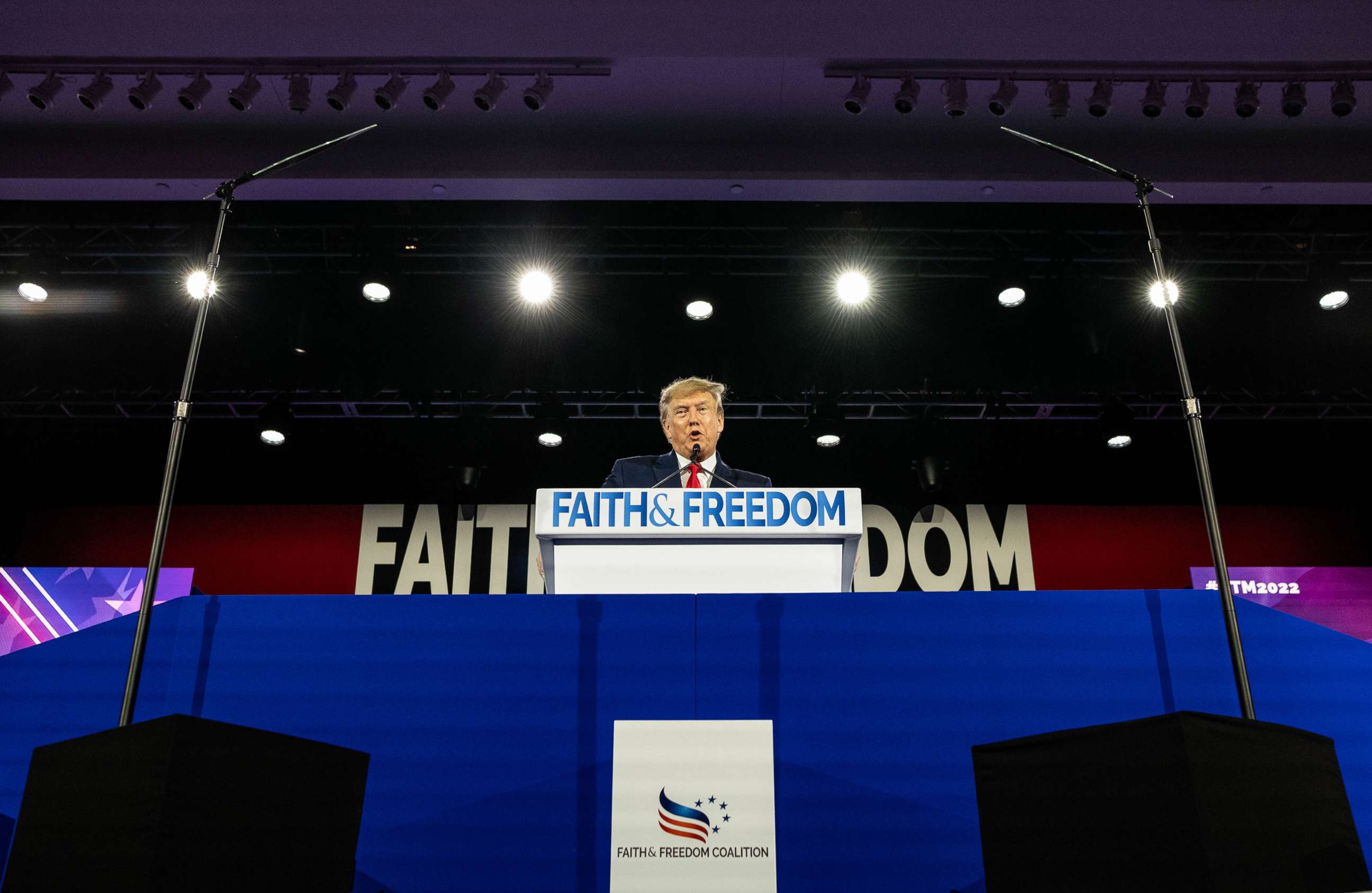
At a Faith and Freedom Coalition conference in Nashville, Tennessee, in June, he told the audience that "we believe that America's destiny depends on upholding the Judeo-Christian values and principles of our nation's founding, and above all else, we know this: in America we don't worship government -- we worship God."
At a rally Thursday night in Phoenix, GOP candidate for governor Kari Lake brought the crowd to their feet invoking God, saying she was on a mission to "save this republic."
"We've got to bring God back into our culture. We've got to bring him back in. We cannot get through this without God. We can't do it. And we're going to bring God back in. And that same God that parted the Red Sea is with us right now. And God is looking down on us saying, 'I picked every single one you to be here at this moment in history,'" she said, later adding, "Because we are put here to save this country and to save this state, and it's gonna start right here in Arizona."
A recent investigation by the Associated Press and Frontline also found that Mike Flynn, Trump's former national security adviser, has been heading a group that claims America is in a fight for its soul as a "Christian nation."
Although the full extent of the movement is unclear, experts who spoke with ABC News warned that the ideology of Christian nationalism threatens American democracy. They said it could lead to politicians passing laws that supporters believe reflect specific Christian values, degrade America's general freedom of religion and lessen the public's trust in election results.
For context on the popularity of Christianity in the U.S., the Pew Research Center found in a 2021 survey that 63 percent of Americas self-identify as Christians; while 29% describe themselves as "nothing in particular," agnostics, or atheists; and 6% identify with other faiths.
What is 'Christian nationalism'?
Experts define religious nationalism in politics as officially favoring one religion over others, fusing religion and national identity together. In the United States, for some this has manifested itself as seeing America as a Christian nation -- as opposed to a nation for people of all faiths -- and that to be a true American is to be Christian.
It is related to "a longstanding sense that's quite bipartisan and mainstream, that America has a special relationship with the divine," Irfan Nooruddin, a professor of Indian politics in the School of Foreign Service at Georgetown University, told ABC News. Nooruddin is a co-author of "The Everyday Crusade: Christian Nationalism in American Politics" from Cambridge University Press.
"At the core of Christian nationalism in contemporary politics is really the idea of privileging certain views over others, in terms of determining our laws, in terms of even interpreting our Constitution, and in terms of implementing our democracy," Kristin Kobes Du Mez, a professor of history at Calvin University and author of "Jesus and John Wayne: How White Evangelicals Corrupted a Faith and Fractured a Nation," told ABC News.
Christian nationalist views and similar views have been advocated by people other than faith or political leaders. Samuel Huntington (1927-2008), a political scientist who taught at Harvard and Columbia, identified America and Western civilization more broadly with Christianity, and he argued in favor of supporting an 'American Anglo-Protestant' culture in the country. (Huntington faced criticism for sharing views seen as exclusionary towards minority groups.)
Scholars such as Du Mez and Eric McDaniel, co-director of the Politics of Race and Ethnicity Lab at the University of Texas at Austin, also pointed to the role race often plays in Christian nationalism, which some use as an excuse to push anti-Black racism and white supremacy.
Experts say there also are links between Christian nationalism and far-right groups or movements.
"The thing about this is some people have actually argued that this is really nothing but white supremacy masked as a religious movement," McDaniel said.
Christian nationalism in the United States has a long history, according to experts.
"It goes back to even before the founding of the United States, where those coming to this land, saw their mission and vision as one in line with what God desired," Andrew Whitehead, associate professor of sociology at Indiana University - Purdue University Indianapolis, told ABC News. "And so, from the beginning, how they saw themselves and their political structures in their community were aligned with this idea of being distinctively Christian."
Nooruddin highlighted that, nevertheless, the founders made sure to highlight separation of church and state and freedom of religion in the Bill of Rights.
The U.S. Constitution says that "no religious Test shall ever be required as a Qualification to any Office or public Trust under the United States."
The Constitution's First Amendment states that "Congress shall make no law respecting an establishment of religion, or prohibiting the free exercise thereof; or abridging the freedom of speech, or of the press; or the right of the people peaceably to assemble, and to petition the Government for a redress of grievances."
"The Constitution itself is a secular document; it doesn't mention God," Douglas Laycock, a scholar of religious liberty and constitutional law at the University of Virginia Law School, told ABC News.
The religious test clause in the Constitution was even criticized at the time of writing, Laycock said, because it would allow non-Christians and atheists to take office. "But [the writers] deliberately got rid of those religious requirements for public office," Laycock said. While the U.S. population at the time was largely Protestant, "the Constitution was secular, and it was clearly designed to treat all religions equally."
Today, the ideology of Christian nationalism appears to be gaining influence, and polling on the issue shows a divide between the parties.
A Pew Research Center survey conducted in September 2022 found that 45% of adults in the United States believe that the U.S. should be a "Christian nation," although respondents had varied views on what that would mean or if the government should formally declare the U.S. as such. The survey also found that over half of U.S. adults had not read or heard about the term "Christian nationalism."
A University of Maryland poll conducted in May 2022 found that 61% of Republicans would favor the U.S. being declared a Christian nation, as opposed to 17% of Democrats.
What is the difference between religion in politics and religious nationalism?
Experts drew a line between Christian and religious engagement in politics generally, and Christian nationalism.
"All Americans presumably want to see their values reflected in our government, whether those values are shaped by formal religious traditions or otherwise," Du Mez said, adding that there are those who advocate for religious values in democratic ways.
Christians have also always disagreed and been divided on many issues. There are many disagreements within Christianity and other religions regarding faith, theology, and how religion should influence public policy, which date back further than the founding of America or the advent of Christian nationalism in the U.S.
McDaniel, who co-authored the Cambridge University Press book on Christian nationalism, said that there are those who advocate for issues through faith by saying "'my faith tells me that this is how we should handle this issue.'"
"[Christian nationalists' ideology] is 'my faith tells me not only how should we should handle this issue, but how we should structure our government, who should have a say, who should not have a say.'"
'Christian nationalism' in the 2022 midterm elections
When asked how influential Christian nationalism is during the current midterm election cycle, the experts ABC News spoke with agreed it has played a role in the current cycle.
While many politicians don’t use the term, nor would they say that they specifically want a Christian nation, "It's definitely influential in the rhetoric that some politicians use," Whitehead said, whether or not they have identified as Christian nationalists.
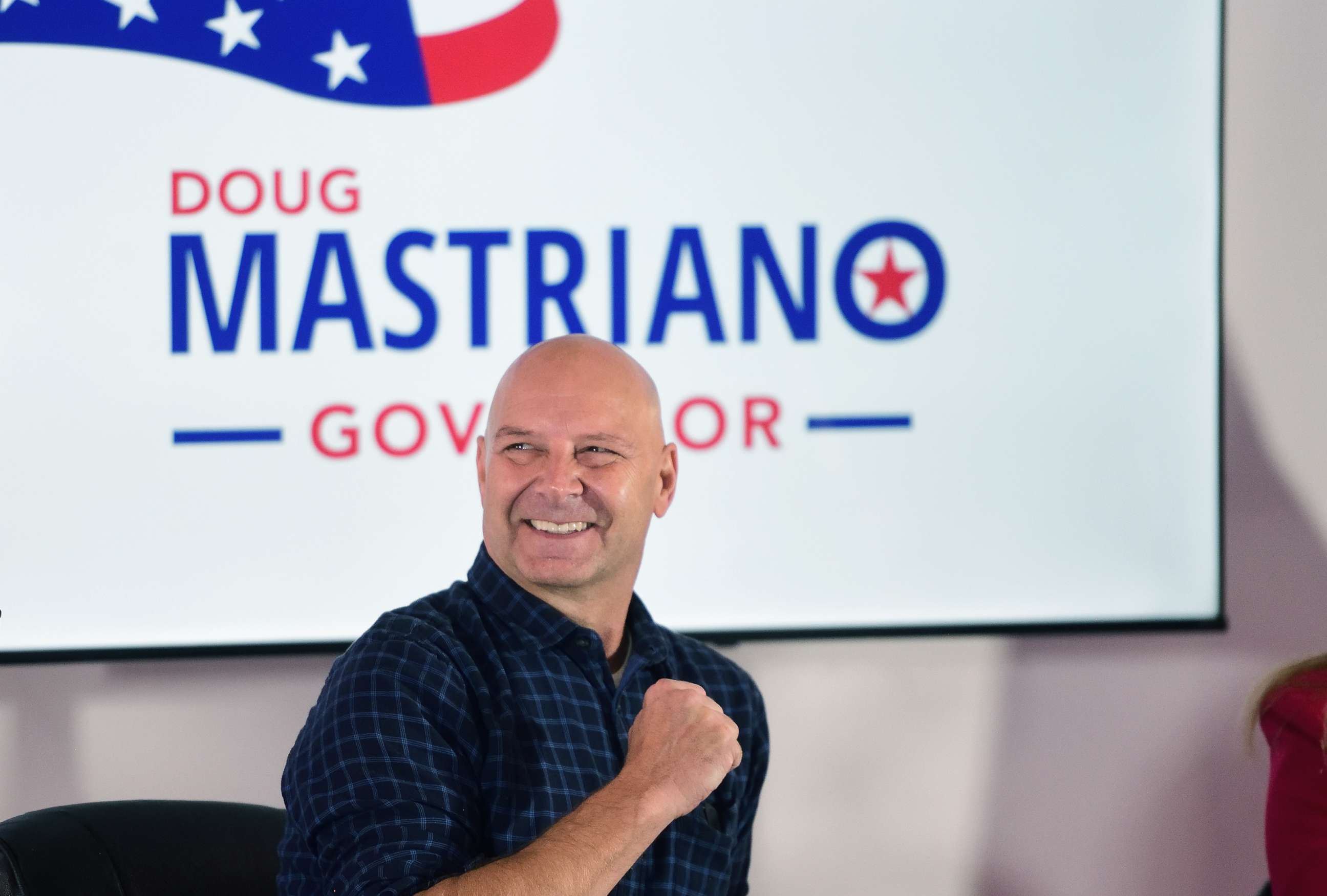
Whitehead said that would include candidates seeing themselves as on missions to maintain America's perceived 'heritage' as a Christian nation, and fighting forces they see as trying to take away that identity.
Some experts told the Associated Press in May that Pennsylvania Republican gubernatorial candidate Doug Mastriano is among other politicians who have tapped into that rhetoric. (Mastriano has not invoked the term of Christian nationalism itself or identified as an adherent of the ideology, and did not respond to the Associated Press's request for comment.)
Mastriano, criticized by some in his party as an extreme candidate, has often invoked Christianity as integral to America in speeches and campaign materials.
"We are designed to be a holy experiment where you can live your life as you see fit and not as a governor, magistrate or any anyone else saw fit," Mastriano said of America at a campaign speech in September.
American democracy at stake?
What does Christian nationalism mean for American democracy?
"I think democracy is on the line here as a result of the threats from Christian nationalism ... yes, it's a minority ideology, but we don't see a lot of opposition to it," Allyson Shortle, associate professor of political science at the University of Oklahoma and another co-author of "The Everyday Crusade," told ABC News.
"So this is something where if you're listening to people who say they want to radically change democratic institutions to favor Christianity, and we're not opposing it… ultimately, they are going to be able to get elected, they're going to form powerful coalitions in leadership and be able to pass a lot of these policies that do chip away at religious freedom, at freedom of speech, at a lot of the democratic freedoms that everybody in America cherishes right now."

Rev. Meriah Tigner, a pastor from Indiana, told ABC News that "I'm seeing a bleeding of Christian values, conservative Christian values specifically, being proposed to be passed as law. So that 'my values, everyone has to follow' because they would be codified."
That could include laws about transgender individuals, for example, "to pass laws to restrict the existence of individuals or to restrict even the discussion about the experience of individuals, because your faith doesn't make space for it," Tigner said.
McDaniel said that Christian nationalism could "set the nation back regarding race, gender, class, sexuality... And after what happened with January 6, there are more concerns about more increased violence."
He added research has also shown that people who are strong supporters of "religious nationalism and white Christian nationalism, are more supportive of authoritarian regimes, and are more open to autocratic rule… while they do like democracy, they are slightly more supportive of alternatives too."
Nooruddin added that trust in elections is at stake as well.
"If [those sympathetic to this ideology] don't win in November, what you can imagine … is that a lot of them will go back to the table, complain the election was stolen, [claim] they were not legitimate, et cetera. So we get a real erosion of faith in elections," Nooruddin said.
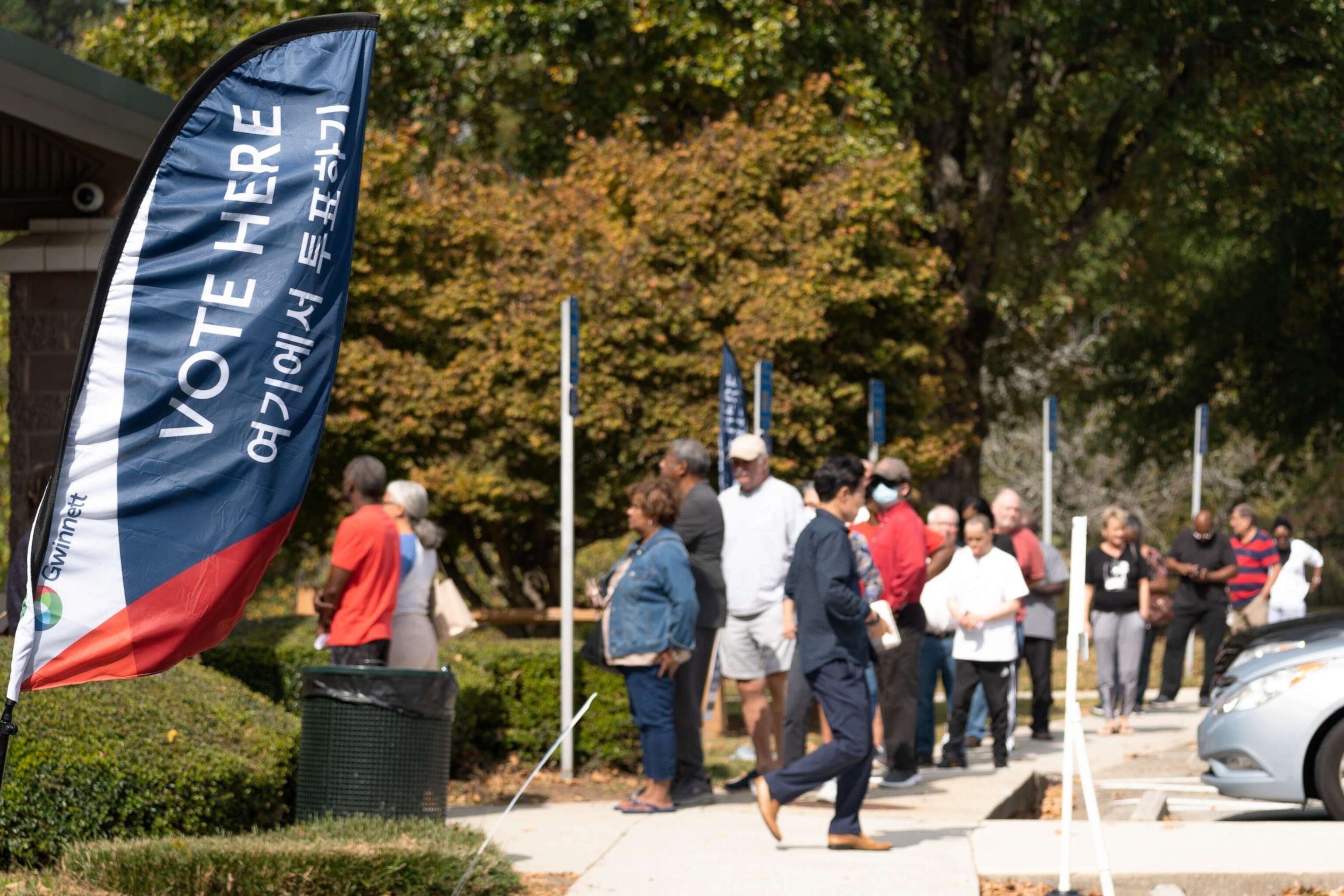
Faith leaders respond to 'Christian nationalism'
Faith leaders have taken notice of the rise in Christian nationalism, and some are speaking out.
Amanda Tyler is the executive director of the Baptist Joint Committee (BJC), an advocacy group that has focused on religious liberty in the United States since its founding in 1936.
Tyler and the BJC launched a "Christians Against Christian Nationalism" campaign, which she calls an "online grassroots network," in 2019 to educate the public about the impacts of Christian nationalism. The campaign centers around a statement of principles speaking out against Christian nationalism, which it calls "a distortion of the gospel of Jesus and a threat to American democracy.".
"When we first started, Christian nationalism, as a term, was relatively unknown," Tyler told ABC News.
But the use of Christian imagery in the Jan. 6, 2021 attack on the Capitol and the embrace of Christian nationalism by some politicians shifted the conversation and brought it to a point "where we risk normalizing Christian nationalism," Tyler said.
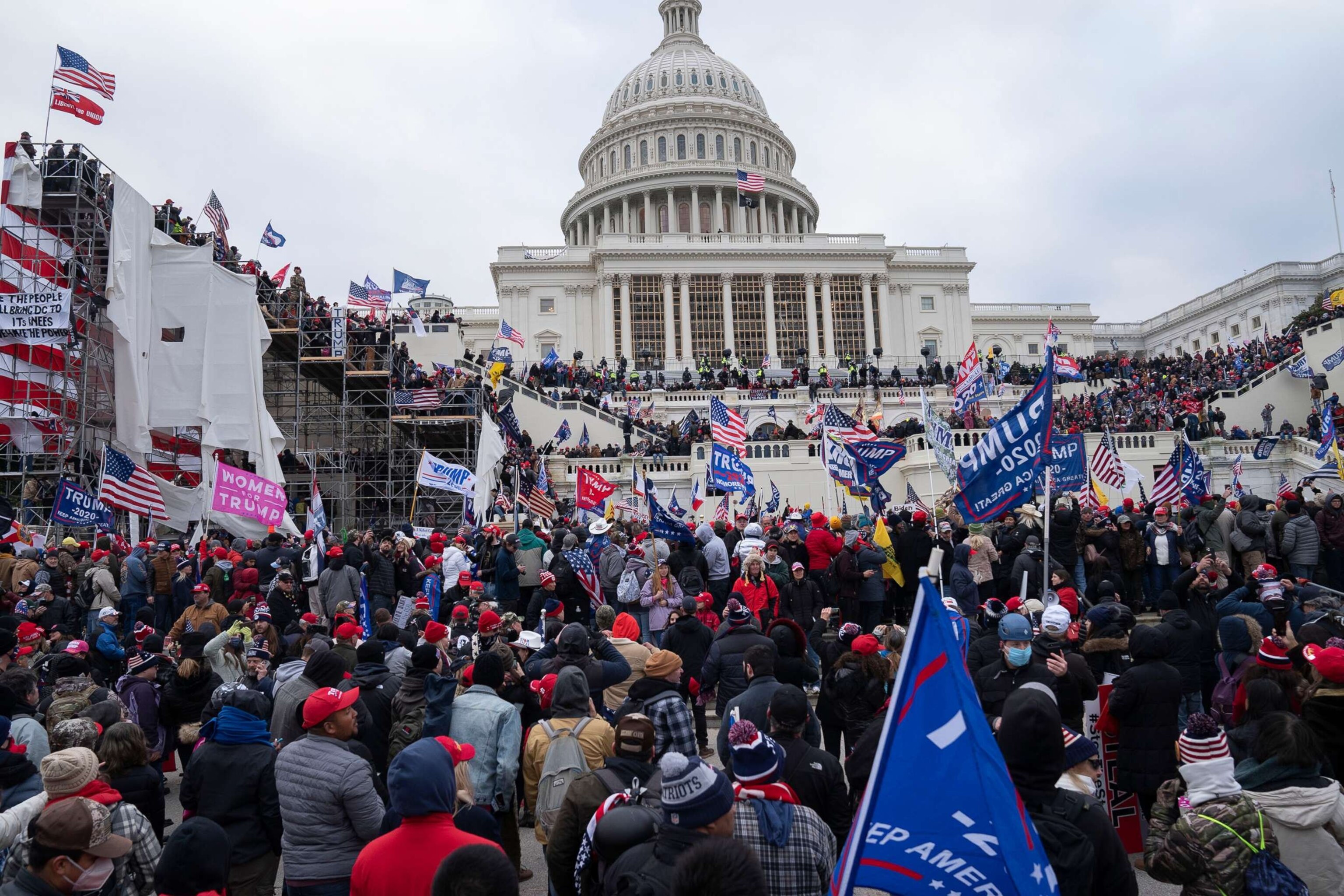
Rev. Jimmie Hawkins, who directs the Office of the Public Witness for the Presbyterian Church, is one of the endorsers of the campaign and sees it as a long-term effort.
He added that it could also help communities reexamine some things they usually took for granted -- such as having American flags in the sanctuary, focusing on issues of sexuality and abortion more than poverty, or even just defining themselves as political.
"Oftentimes, congregations will define themselves using political terminology, you're a blue [Democratic] church or you're a red [Republican] church, or a purple church," Hawkins said. "Almost as of our political identity is our strongest sense of identity even within the church itself... We're not red, blue, or purple churches; we're Christian churches."
The stakes, Hawkins said, are high for religions beyond just Christianity: "People will be guided not by their faith, but by what the state says. And I think we really lose our sense of religious identity."
Rev. Meriah Tigner speaks against religious nationalism in terms of how it contradicts her faith and her identity as an American.
"I'm a Baptist, and Baptists believe in something called soul competency. And it's this idea that God gave us a brain to be able to make decisions, and that God doesn't even force us to follow God," Tigner said. "But God gave us the ability to decide to choose God or not choose God … that really hits at my personal belief that no government should dictate how I should believe."
Christian nationalism, Tigner said, also "really bucks up against our foundation as a country" as a place founded in part for freedom of religion.
Tigner told ABC News that she tries to combat the spread of Christian nationalism through face-to-face conversations and dialogue.
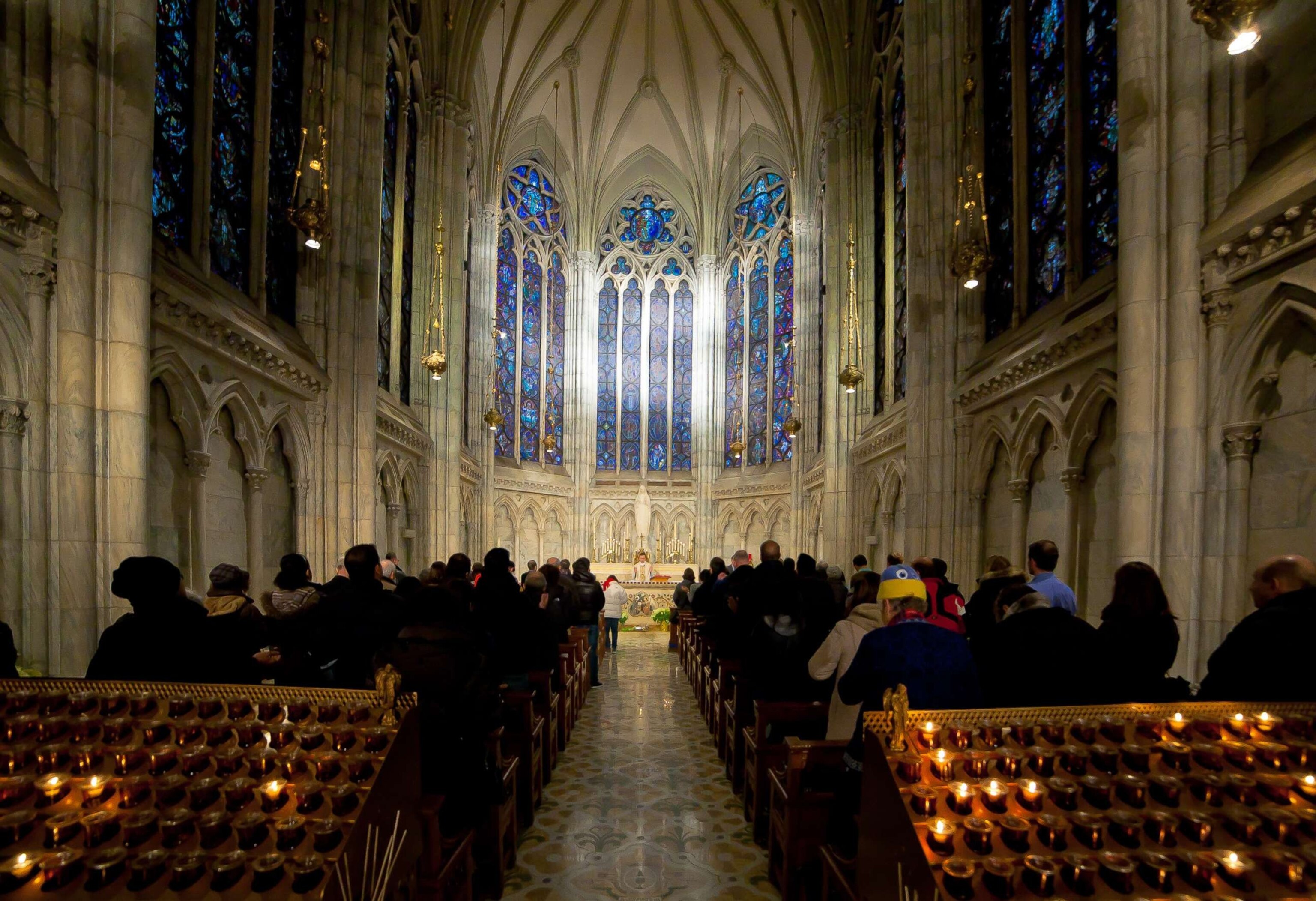
"Through compassionate conversations with people you disagree with, you may actually find middle ground about things, and maybe actually able to have enough humility in the conversation, to hear a new perspective and to change your beliefs," Tigner said.
"So, for me, I feel very convicted about engaging in conversations with people and teaching about the dangers of merging our American civic life with our Christianity; that we can be patriots and we can be Christians, but when you blend those things together, it changes both of them."
ABC News' Libby Cathey, Hannah Demissie, Lalee Ibssa and Will McDuffie contributed to this report.




